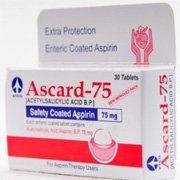
Why is Ascard “Enteric-Coated”?
The enteric-coated Ascard Tablet is designed to resist disintegration in the stomach, but to dissolve in a better neutral-to-alkaline environment of the duodenum. Special enteric coating helps to protect the stomach from injury which may result from ingestion of plain, buffered or highly buffered aspirin, and the patients still gets the same serum salicylate levels and anti-platelet activity as with other form of aspirin.
What is Ascard Used For? >> Ascard Indications
Ascard Tablet (enteric coated aspirin) is indicated for the treatment of:
- Angina Pectoris
- Myocardial Infarction
- Transient Ischemic Attacks
- Prophylactic use of Ascard is also recommended to avoid the chances of thromboembolic disorder.
Ascard is also indicated for the treatment of conditions requiring chronic or long-term aspirin therapy for pain and/or inflammation, e.g., rheumatoid arthritis, juvenile arthritis, systemic lupus, erythematosus, osteoarthritis (degenerative joint disease), ankylosing spondylitis, psoriatic arthritis, Reiter’s syndrome and fibrositis. Ascard Tablets are also used for the relief of pain and inflammation in rheumatic fever.
Ascard Dosage in Angina Pectoris & Myocardial Infarction
The recommended dosage indicated for anti-platelet function is one tablet of Ascard 75 mg daily or as directed by the physician.
- Study in 333 USA physicians with “Unstable Angina” indicated that low dose aspirin reduces the risk for 1st myocardial infarction.
- Patients with Silent Ischemia may benefit from low dose aspirin. Ascard can be used as initial management to stop thrombosis progression and increase coronary blood flow.
- Single doses of 40 to 80 mg and 50 mg respectively are capable of inhibiting platelet aggregation without having a significant or long lasting effect on vascular prostacyclin.
In conditions such as Transient Ischemic Attacks and for Analgesic or Anti-inflammatory indications, the dosage of Ascard Tablets can be increased or modified according to the clinical situation of the individual patient under a physician’s directions.
Ascard Tablets Vs Plain (non-enteric coated) Aspirin
- The bioavailability of Ascard has been demonstrated in a number of salicylate excretion studies. The studies show levels of salicylate (and metabolites) in urine excreted over 48 hours the enteric-coated aspirin do not differ statistically from plain i.e., non-enteric coated aspirin.
- Plasma studies, in which Ascard has been compared with plain aspirin in steady state studies over eight days, also demonstrated that enteric-coated aspirin provides plasma salicylate levels not statistically different from plain aspirin.
- Dissolution of the enteric-coated occurs at a neutral-to-basic pH and is therefore dependent on gastric emptying into the duodenum. With continued dosing, appropriate plasma levels are maintained.
How safe is Ascard?
The safety of Ascard Tablets (enteric-coated aspirin) has been demonstrated in a number of endoscopic studies comparing it with plain aspirin as well as plain, buffered and arthritis-strengths buffered preparations. All aspirin forms were given at a dose of 3900-4000 mg per day for 14 days. The normal healthy volunteers participating in these studies were gastroscoped before and after the medication and 14 days drug free periods followed active drug. Compared to all the other preparation, there was significantly less gastric and duodenal damage during the course of the enteric-coated aspirin.
Ascard >> Drug Warnings
Children and teenagers should not use Ascard Tablets for chicken pox or flu symptoms, before a doctor is consulted about Reye’s syndrome, a rare but serious illness. If pain persists for more than 10 days, or if redness is present, or in arthritic or rheumatic conditions affecting children under 12 years consult a physician immediately. Discontinue use if dizziness, ringing in ears or impaired hearing occurs. If you experience persistent or unexplained stomach upset, consult your physician.
Ascard during Pregnancy and Lactation
Ascard Side Effects
- At least 4 out of 100 patients experience a stomach pain when treated with Ascrad Tablets.
- At least 12 out of 100 patients experience a heartburn when treated with Ascard Tablets.
- At least 2 out of 100 patients have symptoms e.g. Nausea and Vomiting when treated with Ascard Tablets.
- The rate of hospitalization for gastrointestinal disorder associated with the treatment of Ascard is at least 4%.
can ascard treat swollen limbs
I am on high blood pressure drug losatan with htcz, and I have lots of pain in the back and stiffness of the neck, I take different pain killers but sometimes the pain persist, can I take ascard as a pain killer while on hypertension drugs.
Yes bro.u can take it.i also have neck.upper and lower back back due to blood clotting.this medicine is giving me lot of comfort.but i suggest u tp use Ascard Plus.which is much powerfull than simple ascard..
I also use ascard to reduce risks of getting stroke due to blood clots
Hi? My patches of my head pain as there is pus burning inside but nothing on the surface. Can i take ascarf-75? And how long?
Is it recommended for treatment of vericose veins in pregnancy?
Been having numbness at my thigh joint,, especially when seated, eventually makes my left side feel really awkward, like it's got no blood,I don't know whether I imagine things but often I feel like I'm breathing empty air,light headed and all starts with the thigh discomfort.
My left side often feels numb or reeeally tired,,head to toe plus some dull chest pains mostly turning towards left hand and between shoulders at the back,, can ascard resolve this?
Sir we can use Ascard 75 mg for vertigo.plesae.
Sir my wife also taken ascard 75mg for baby concieving
please tell me what benefit this medicine?